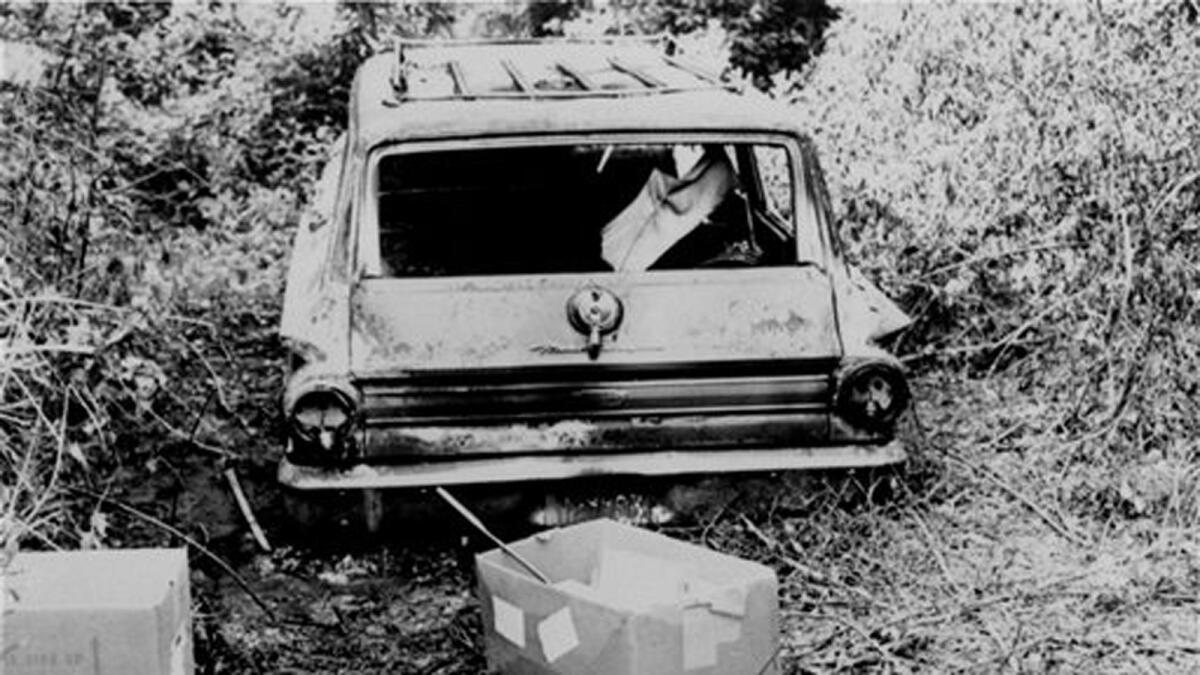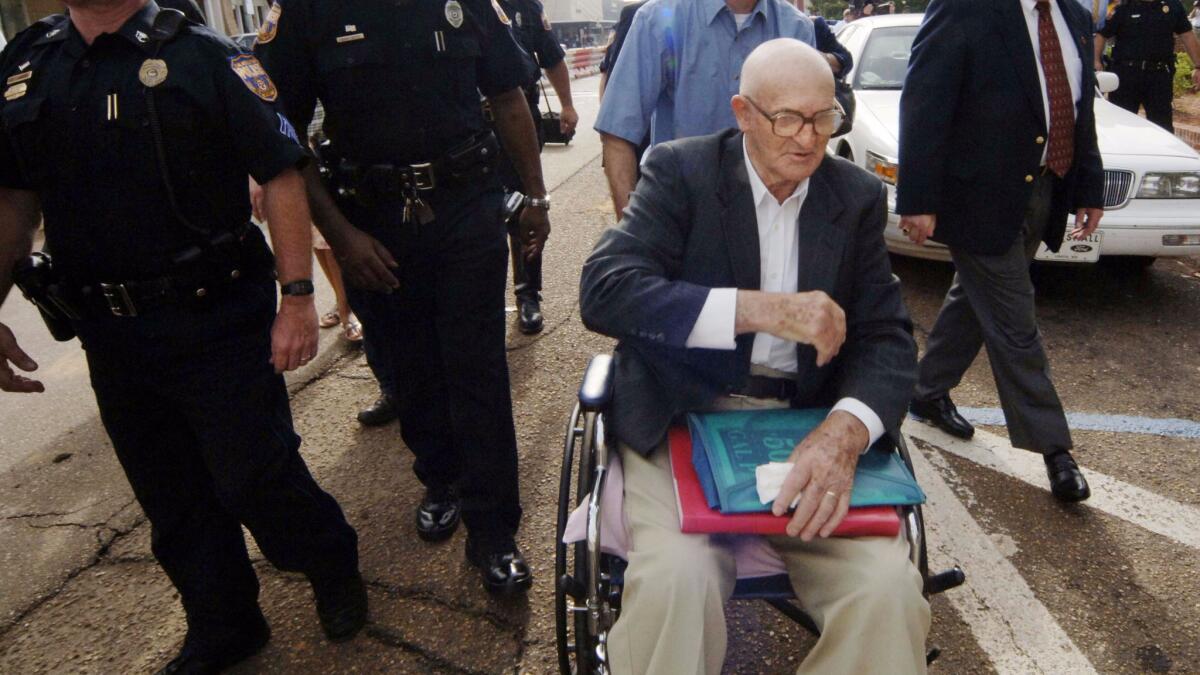They dared to register blacks to vote, and the KKK killed them: A 52-year-old case is closed — unsolved
- Share via
A former Klansman is serving what amounts to a life sentence, but one of the most infamous murder cases of the civil rights era has long been overshadowed by a sense of justice denied.
Though three federal investigations spanned decades, prosecutors never obtained a murder conviction. This week, federal and state officials reluctantly conceded that the investigation into the killings of Andrew Goodman, Michael Schwerner and James Chaney is closed -- and still unresolved.
For the record:
5:21 a.m. June 21, 2016An earlier version of this article referred to Nekosha County Deputy Sheriff Cecil Price. Price was a deputy sheriff in Neshoba County, Miss.
“There’s nothing else that we can do,” Mississippi Atty. Gen. Jim Hood announced at a news conference Monday, a day before the 52nd anniversary of the slayings. “All’s been done unless some other witness comes forward.”
Chances of that are slim. Most people involved are dead or elderly with memories too faint for testimony.

The killings helped spur President Lyndon B. Johnson to push for the Voting Rights Act of 1965.
Goodman, Schwerner and Chaney had traveled to Neshoba County, Miss., to register black voters during the height of Freedom Summer. Goodman and Schwerner were white, Chaney black. Their deaths inspired the 1988 movie “Mississippi Burning,” and the incident is sometimes known as the Mississippi Burning case.
Goodman, Schwerner and Chaney met in Ohio in June 1964 at a training session for the Congress of Racial Equality ahead of Freedom Summer, an effort to register black voters in Mississippi and set up Freedom Schools, alternative free schools for black Southerners. Mississippi had one of the largest and most disenfranchised black populations. A decade after Brown vs. Board of Education, its schools were still segregated.
The three men were teaching hundreds of volunteers how to navigate the racism and violence they would encounter in Mississippi. At the conference, Schwerner, 24, heard that one of the Freedom Schools he helped organize in a church had burned down. Along with 21-year-old Chaney and 20-year-old Goodman, he drove to Mississippi on June 20 to investigate.
On June 21, they were arrested by Neshoba County Deputy Sheriff Cecil Price on charges of speeding. They were released from jail that night, and Price helped two cars stuffed with Klansmen track down the friends’ station wagon as they drove down Highway 19. They were stopped, yanked from their car and taken in the officer’s car to a rural road, shot and buried 15 feet below an earthen dam. It was 44 days before their bodies were discovered.
See more of our top stories on Facebook >>
Of 19 people thought to have been involved, local authorities declined to charge anyone. A sheriff’s deputy aided the Klan in killing the men, and law enforcement shielded them from punishment. In 1967, eight men were convicted on federal charges of violating the victims’ civil rights, with none serving more than six years in prison.
Decades later, a Jackson Clarion-Ledger reporter’s investigation later helped uncover new evidence that led to the 2005 conviction of Edgar Ray Killen, a Klansman and minister involved in the killing. Three black jurors and nine white jurors rejected the murder charges against Killen but found him guilty of three charges of manslaughter for recruiting the lynch mob that killed the men.
Killen was convicted 41 years to the day of the killings. Two days later a judge sentenced Killen to 60 years in prison.
The killings are one of 113 pre-1970 cold cases of racially motivated murders the FBI doubled down on since the passage of a 2008 unsolved crimes law named after teenage lynching victim Emmett Till. According to a 2015 Justice Department report, 105 of such cases have been closed, with “very few” prosecutions.
Yet “this is one of the biggest cases of this century,” and among those cold cases, said Cliff Johnson, director of the MacArthur Justice Center at the University of Mississippi School of Law. In a time when minority voting rights are again being fiercely debated among activists and lawmakers, the Mississippi Burning killings are all the more relevant, he said.
“You’ll find two groups of people in Mississippi. There are those who were alive at the time and have acute knowledge of these horrific acts. People that recognize that justice was never done,” Johnson said. “Then you have a second group of people from whom this is something from a history book.”

The Justice Department’s third investigation into the case began in 2010 with the goal of seeing whether there was evidence to prosecute any surviving suspects.
“Despite one of the most intensely investigated and documented underlying investigations of any racially motivated murder during the 1960s, followed by the exhaustive efforts of more recent reinvestigations, the passage of time has simply rendered additional prosecutions impossible,” Vanita Gupta, head of the Justice Department’s civil rights division, said in a statement Monday.
“While legal and factual impediments sometimes prevent us from bringing cases we wish that we could, the civil rights division remains dedicated to pursuing racially motivated crimes wherever the facts allow.”
David Goodman, Andrew’s brother, who lives in New York, said he wasn’t surprised the investigation was closed, “because the [killers] were never tried and most of them are dead.” Yet Goodman, who runs a social-justice-oriented foundation named after his brother, said the case speaks to something bigger.
“My brother wasn’t murdered because he was white or because he was an activist. He was murdered because, to the people that murdered him, black lives didn’t matter. To a lot of people, they still don’t matter,” he said. The case is “an opportunity for us to recognize history in the context of the present moment. Nothing is closed about racism in America.”
ALSO
Where the world stands on gay rights
In China, feminism is growing — and so is the backlash
In an attempt to stem abuses, the Border Patrol gets a new chief — from the FBI
Jaweed Kaleem is The Times’ national race and justice correspondent. Follow him on Twitter and Facebook.
More to Read
Sign up for Essential California
The most important California stories and recommendations in your inbox every morning.
You may occasionally receive promotional content from the Los Angeles Times.











